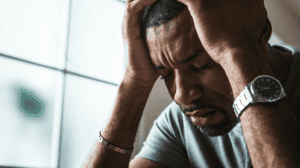What most people associate with depression is a feeling of gloom or sadness, but there is a much more important set of symptoms to keep in mind: depression is usually accompanied by a “slowing down” of the body. A profound lethargy or fatigue is probably a more important signal that you have succumbed to depression than whether or not you feel profoundly sad. The more pronounced the fatigue, the more serious is your depression.
What are the more common symptoms of a major depression? Usually, it is diagnosed when at least five of the following symptoms are present during the same time period, with at least one of the first two symptoms present. In addition, the symptoms must be present most of the day, nearly daily, for at least two weeks:
- Depressed mood
- A marked diminished interest or pleasure in almost all activities
- Significant weight loss/gain
- Insomnia or hypersomnia (over-sleeping)
- Agitation or retardation of thinking, memory, etc.
- Fatigue or loss of energy
- Impaired concentration and indecisiveness, or
- Recurring thoughts of death or suicide
Reactive depressions can have some or all of the above, but they are usually not as debilitating. Most people with reactive depression can continue their normal work and home duties. With the more serious endogenous depressions, people can become totally incapable of fulfilling normal life responsibilities.
Primary care physicians need to be alert for the signs of depression. Studies have shown that 6 to 8 percent of all outpatients in primary care settings have major depressive disorder. Often, their physical complaints are a mask for the depression.
Physical complaints that mask depression
If you find yourself experiencing any of the following, you may want to ask whether you are depressed:
- Pain — including headaches, body aches and abdominal pain
- Low energy and excessive tiredness (including claims of being “chronically fatigued”)
- Reduced capacity for pleasure or enjoyment
- Moods such as apathy, irritability, anxiety or sadness
- Sexual complaints or problems with sexual functioning or desire
Lesser forms of depression may produce some or many of these symptoms or the symptoms may not be as persistent. Discuss this with your doctor to see if you are possibly suffering from a “low grade” form of depression.




















